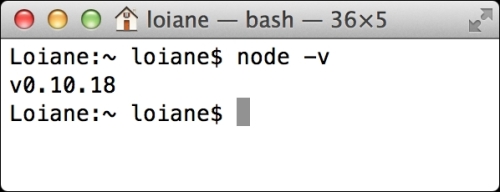Setting up Node.js
Since we will be developing a Node.js application, the first step is to have Node.js installed. We can get it from http://nodejs.org/download/. Just follow the download instructions and we will have it set up on our computer.
Note
If this is your first time working with Node.js, please go through the tutorials at https://nodejs.org/.
To make sure we have Node.js installed, open the terminal application (Command Prompt, if you're using Windows), and type node –v. The Node.js version installed should be displayed as follows:

We are now good to go!
































































